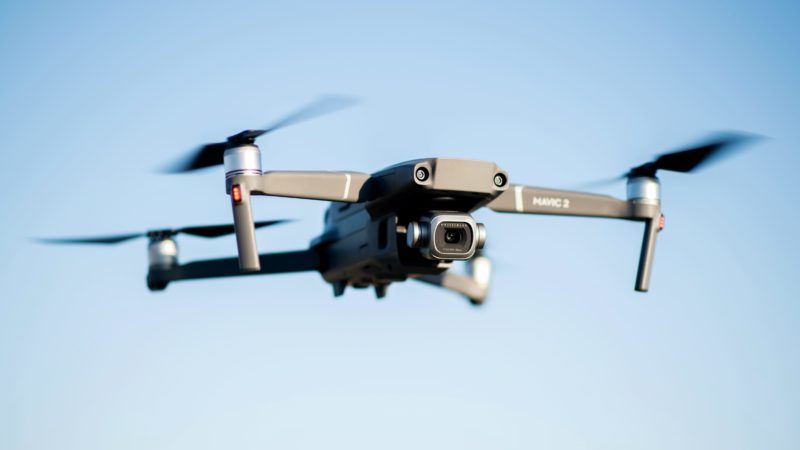Feds Ground 800 Drones Over Fears About Chinese-Made Tech
But without specifying an actual cybersecurity risk, the policy comes off looking like a wasteful protectionist maneuver that will likely put human pilots back in riskier situations.

The Department of the Interior has issued new internal rules banning agency employees and contractors from using drones made in China or built with Chinese parts. The rule, which will not apply to privately owned drones or those operated by the military, is supposedly motivated by national security concerns. It will likely increase costs and reduce the Interior Department's ability to conduct aerial observations.
This ban is the latest development in what may be a nascent technological cold war between the United States and China. As with President Donald Trump's recent actions targeting Chinese telecom companies Huawei and ZTE (as well as some Chinese microchip makers), the Interior Department's (DOI) new drone policy is wrapped up in worries that China could use the devices to spy or access government data.
Interior Secretary David Bernhardt told The Wall Street Journal that he decided to issue the order after reviewing the security risks that drones could present. The department had already grounded its entire drone fleet last year in order to conduct the review; this week's action makes that grounding permanent. The department has more than 800 drones, all of which contain at least some Chinese-made parts, and it uses them to inspect federal dams, observe endangered species, and monitor wildfires, the Journal reports.
Those drones were used for more than 10,000 flights last year, saving taxpayers more than $14 million by substituting for helicopters and airplanes. They also help keep humans out of risky situations; drones can operate in conditions that would be too smokey for human pilots, for example. Legitimate national security worries should be taken seriously, but the decision entails trade-offs. The department's blanket ban on all non-emergency use of foreign-made drones concerns some observers.
"Drone restrictions based on nationality rather than security standards won't protect our nation from cybersecurity vulnerabilities. Discrimination against foreign-made drones means our country won't have access to the best technologies," says Carl Szabo, vice president of NetChoice, which advocates for free markets in technology. "What we really need are cybersecurity standards for drones that apply to all manufacturers, enabling greater competition and security."
Bernhardt also suggested that domestic politics and the Trump administration's anti-China protectionism might have played a role in shaping this policy. "He hopes U.S. manufacturers will eventually replace foreign suppliers in an industry now dominated by China," the Journal reports.
Chinese drone manufacturer DJI has already accused the Trump administration of cutting off drone purchases for protectionist reasons. "The U.S. government's concerns about DJI drones, which are part of the DOI fleet, have little to do with security and are instead part of a politically motivated agenda to reduce market competition and support domestically produced drone technology, regardless of its merits," the Shenzhen-based company said in a statement.
When the U.S. imposed the temporary drone grounding last summer, the company told the Journal that its products had been verified as secure by independent cybersecurity professionals and that the Chinese government has never asked for data from the company. But China does have the ability to exert authority over its domestic companies, and—as in the ongoing debate over whether Huawei telecom products are safe—there are reasons to be wary of promises about independence.
Hanging over all of this is the unfortunate fact that one of the Trump administration's favorite maneuvers in its ongoing trade war has been to stretch the definition of "national security" in order to impose protectionist measures. Tariffs on steel and aluminum were imposed on the specious grounds that imported metals threatened American national security. Trump has often threatened to slap tariffs on foreign-made cars under the same, questionable, rationale.
It's possible that the Interior Department has real reasons to ban foreign-made drones. But the administration has forfeited its credibility when it comes to using "national security" as the basis for a policy that will, as Bernhardt readily admits, favor American drone-makers over foreign competitors.
Even if that's not a consideration, an outright ban on foreign drones that doesn't include specific standards for cybersecurity is a wasteful move that will require spending millions of dollars to replace a perfectly good drone fleet with potentially lesser alternatives. The decision may also result in American pilots flying missions that are safer and less expensive when completed with Chinese drones.


Show Comments (8)